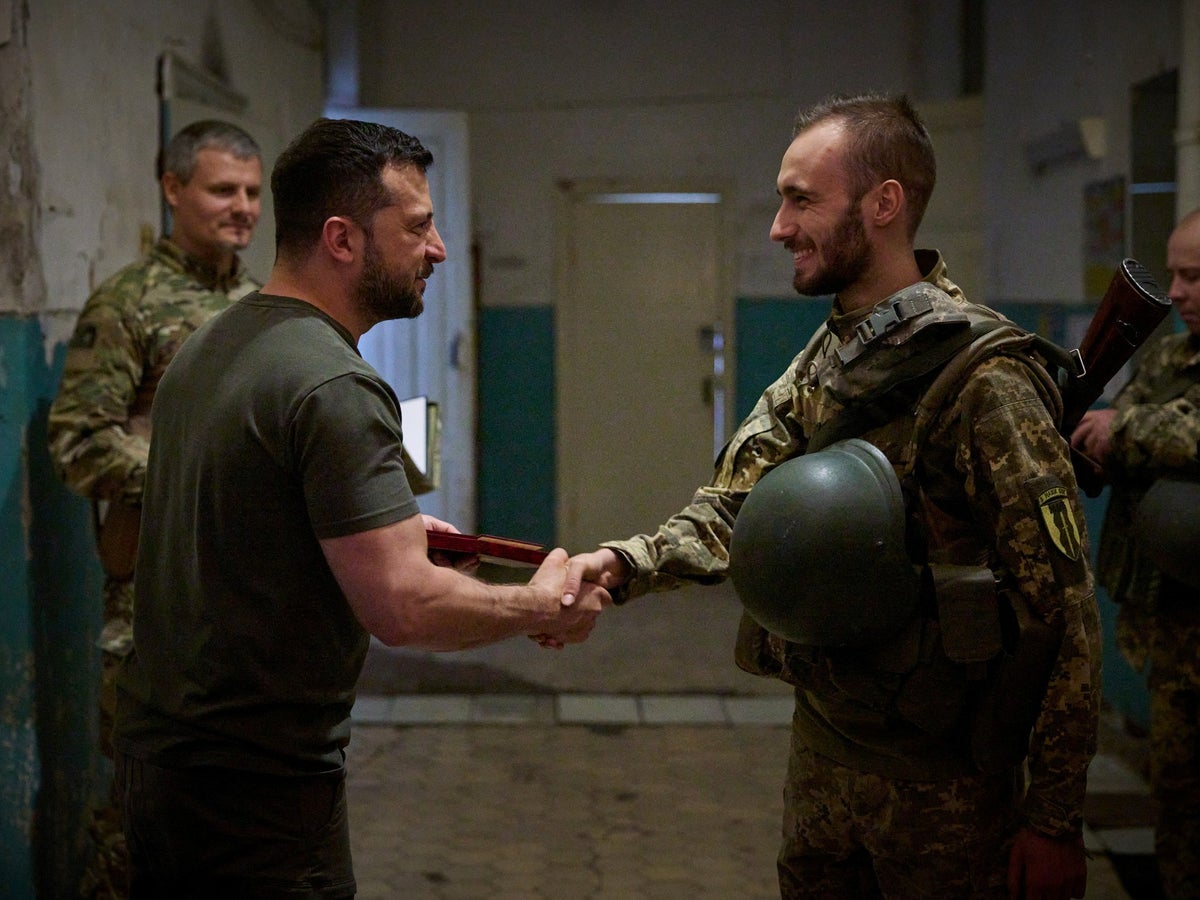
Ukraine’s president Volodymyr Zelensky on Monday visited troops close to the frontline in eastern Ukraine, with his military reporting gains around the town of Bakhmut.
The deputy defence minister, Hanna Maliar, said that Kyiv’s troops had managed to retake nearly 2 square miles during the past week around the ruined Bakhmut – the scene of some of the bloodiest fighting of Russia’s near 18-month war, which has gained symbolic significance for both nations.
Mr Zelensky visited brigades involved in attacks on the section of the frontline facing Soledar, the Russian-held town north of Bakhmut.
Ms Maliar said that Ukraine’s forces had “some success” in pushing back Moscow’s troops in one part of the southeast where Ukrainian forces are trying to retake Russian-occupied territory. Progress has been hampered by widespread mining of positions by Russian troops, as well as strong fortifications, but the deputy defence minister said that the Ukrainian military had pushed forward around the village of Staromaiorske, around 96km (60 miles) southwest of Russian-held Donetsk. Troops were also fighting for control of the neighbouring settlement of Urozhaine.
A Moscow-installed official in an occupied part of Ukraine’s Zaporizhzhia region said on Sunday that Kyiv was attempting to break through Russian lines by gaining a foothold in both villages.
Ms Maliar said in a statement to an official military platform: “Hostilities are taking place in the vicinity of Urozhaine and the fight is for this particular locality. There is some success on the southern and southeast axes in the vicinity of Staromaiorske.”
While Ukraine has made some progress in regaining Russian-held territory since it started its counteroffensive in June, some Kyiv officials have acknowledged that gains have been slower than they, or Western allies, would have liked. However, Mykhailo Podolyak, an adviser to President Zelensky, hit out at such thinking on Monday. The Ukrainian army has no intention of engaging in a series of conspicuous “large-scale battles” against the Russians as it moves forward, Mr Podolyak said on the X platform, formerly known as Twitter. The goal, he said, is a piecemeal and systematic destruction of “the capabilities of the enemy army: its logistics, technical potential, officers and personnel”.
Ms Maliar was clear about the challenge Kyiv is facing in her statement. “The armed forces are facing complete mining of the territory, cement fortifications of the key heights, [and] constant mortar and artillery shelling,” she said. “Additionally the Russians are densely using aviation.” She also said Russian troops were continuing their assault around the eastern towns of Kupyansk and Lyman, where she said they were regrouping.
“The Russians have intensified these offensives after success of the Ukrainian army on Bakhmut axis,” Ms Maliar said.
Russia still controls around a fifth of Ukraine, including the Black Sea peninsula of Crimea, Luhansk region in the east and parts of the regions of Donetsk, Zaporizhzhia and Kherson. The occupied territory includes most of Ukraine’s coast line and parts of its industrial heartland, the Donbas.
Overnight into Monday, Russia launched three waves of drones and missiles against the southern Ukraine port city of Odesa, officials said, although the Ukrainian air force said it intercepted all of the drones and missiles. Falling debris from the interceptions of 15 Shahed drones and eight Kalibr missiles damaged a residential building, a supermarket and the dormitory of an educational facility in the city, the Odesa governor, Oleh Kiper, said. Ukraine’s presidential office also said that at least eight civilians were killed and 23 others were wounded in Ukraine between Sunday and Monday mornings.
In the latest drone attacks on Russia, the country’s Defence Ministry said air defence systems shot down an unspecified number of drones over the Belgorod region on the border with Ukraine.
Russia’s central bank is also due to hold an unscheduled meeting to discuss the level of its key interest rate – in the wake of the rouble falling to its lowest value for more than 16 months.
Pressure on the Russian economy is growing as the Kremlin continues pumping vast sums into its invasion of Ukraine. The country has been targetted with sanctions led by Western nations since the invasion began.
Imports are also rising faster than exports, sending the rouble past 100 per US dollar. The rouble plummeted as low as 119 per US dollar shortly after President Vladimir Putin launched his invasion in February 2002, but was later stabilised through capital controls and Russia’s lucrative oil and gas exports. The rouble has lost about a quarter of its value against the dollar since the start of the war.
On Monday morning, the central bank said it saw no threat to Russia’s financial stability from the rouble’s fall. But by the afternoon, they had announced that a meeting will take place on Tuesday morning. The central bank hiked rates to 8.5 per cent, having held them steady since September. Ahead of what was due to be its next meeting in September – before the latest announcement – the bank has been signalling that more hikes are needed.
Kremlin officials blamed the central bank and “loose” monetary policy for the fall in the rouble. “The main source of rouble weakening and accelerating inflation is soft monetary policy,” Maxim Oreshkin, an economic adviser to Mr Putin, said. “The central bank has all the tools to normalise the situation in the near future and ensure that lending rates are reduced to sustainable levels.”
“The current exchange rate has deviated significantly from fundamental levels, and its normalisation is expected in the near future,” Mr Oreshkin wrote in an article for the state-owned Tass news agency. “A weak rouble complicates the economy’s structural transformation and negatively affects the population’s real incomes,” he added. “It is in the interests of the Russian economy to have a strong rouble.”
Reuters and Associated Press contributed to this report







